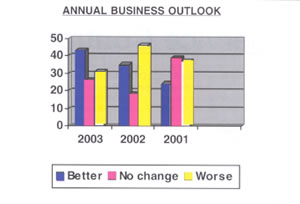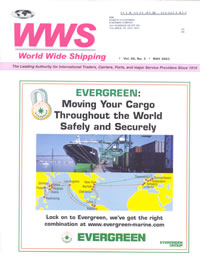|

3PLs FACE CHALLENGE: SELLING INTANGIBLE
Warehousing marketing maven Kenneth B. Ackerman believes warehouse
operators can meet the challenge of "branding and selling an intangible" if
they can identify and market the "special magic" that sets them
apart from competitors.
Speaking March 26 at the annual convention of the International
Warehouse Logistics Association (IWLA) on Miami Beach, Ackerman
pointed to the 2003 gathering's title -- "Keeping the Wind in
Your Sales" -- and commented, "The real key thing in this business,
as the conference title implies, is selling.
"There was a time we were selling buildings," Ackerman said, noting
how warehouse owners would take "enormous pride" in presentations
focusing on pictures of their facilities.
"I think we've progressed from that to selling people," continued
Ackerman, who has been in the warehouse and logistics business
since 1957. He served as chairman of Westerville, Ohio-based Distribution
Centers Inc. before becoming a Columbus, Ohio-based consultant
and industry handbook author.
"Anybody can build a building," he said. "The key is to have good
people in it."
The challenge, according to Ackerman, is proving to prospective
-- and current -- customers that these people are "superstars."
"Selling warehousing must start by identifying `special magic,"'
he said. "You must be a star at something. It may not be storage
and handling. It may be inventory, IT (information technology),
packaging, precise delivery... You've got to pick a niche
and establish it."
EXPECTATIONS CITED
Ackerman
listed 11 key customer expectations for
outsourced warehousing that should be taken into consideration
by any provider
in the branding process:
- Perfect shipping, on time, without exceptions;
- Flawless inventory control; - No warehouse damage;
- No theft or mysterious disappearance; -Dependability, with
all promises always kept;
- No surprises;
- Teamwork relationships with truckers;
- Perfect receiving;
- Minimal dock-to-stock time;
- Minimal order cycle time; and
- Ability to easily adapt to special situations.
While he conceded that some of these expectations cannot be 100
percent fulfilled -- "nobody has no warehouse damage unless they're
hiding it!" -- Ackerman said it is important that warehouse operators
do all they can to achieve these objectives and to demonstrate
their efforts and successes to customers and prospects alike.
Part of this process also includes determining what present --
and former -- customers, as well as prospects, think of the warehouse
operator.
"What you think is important is far less critical than what they
think," Ackerman said. "If you are working at branding, you have
to associate your brand with something attractive."
For example, he said, Hamden, Connecticut-based USCO Logistics,
the largest North American network of shared
warehouses, effectively sells both internally and externally its
motto that it has its "House in Order."
BRANDING CLEVER!
Perhaps the cleverest branding in the business, according to Ackerman,
has been done by a Scranton, Pa.-firm that now goes by the official
name of Kane Is Able Inc. The corporate name change was the last
step in a process that began when officials of the Kane family
business responded to a state trucking authority questionnaire
that asked, among other things, if the carrier was "able and fit" - "and
a light came on."
"Of course, what is most important is what Kane does each day
to prove it is able," Ackerman said.
On the other hand, he questioned the effectiveness of UPS - Atlanta-based
third-party logistics (3PL) provider United Parcel Service of
America Inc. -- in using "brown" in its branding. He said he understands
why UPS trucks began being painted brown, to not show road dust,
but, from a marketing standpoint, Ackerman asked, "Why is brown
desirable? It just plain isn't relevant."
It is equally important for favorable "special magic" branding
to be sold within the company as to those outside it, Ackerman
said, commenting, "If you don't, you will soon get very embarrassed."
He termed line-level supervisors and customer service representatives "the
folks who can support your brand or tear it down more than anyone," and
he urged that they be sufficiently trained.
Ackerman said he sees as "the greatest sea change" in the warehousing
and logistics business a recent approach by some manufacturers
to view logistics as "just a form of purchasing." That, he said,
means an executive with neither knowledge nor interest in warehousing
may be making warehousing decisions.
"If that's so, you may be selling your services to an ex-shoe
buyer or an ex-meat buyer," Ackerman said. "So you've got to be
able to go to that ex-shoe buyer and educate them. After all,
branding and selling are forms of teaching."
NAME CHANGE EYED
The IWLA may well be changing its branding soon.
The trade group, which began in 1891 as the American Warehousemen's
Association and five years ago became the International Warehouse
Logistics Association when it added Canadian and Mexican members,
is considering a moniker that better reflects activities of its
membership, according to Gary N. Owen, who assumed chairmanship
of the IWLA at the March convention.
Owen, who is senior adviser for Nashville-based 3PL provider Ozburn-Hessey
Logistics, said, "The old logistics industry is changing. The
customer's demanding a lot more. We truly are no longer just a
warehouse association."
He said a new name is expected to be in place by the group's 2004
convention, set for March 28-31 in Phoenix.
IWLA BUSINESS
OUTLOOK REPORT PUBLISHED

51 percent of respondents project using more space this
year than in 2002. |
While the warehouse logistics industry is experiencing an uptick
in business this year, uncertainty about the overall economy and
world events has resulted in greater pessimism regarding the overall
2003 business climate.
Those results are according to the annual Business Outlook published
by the IWLA. The report was unveiled on March 24 at IWLA's annual
convention in Miami, Fla.
The IWLA study says that 66 percent of members report that their
company is in a growth mode, and 60 percent intend to hire more
employees in 2003.
However, while 60 percent are either cautiously optimistic or
very optimistic about the business climate for 2003, 40 percent
are concerned or very
concerned. Last year, only 29 percent were in that category.
"Clearly, business seems to have rebounded somewhat in 2003, but
with the economy continuing to sputter, executives aren't ready
to say that business has turned completely," says Joel Hoiland,
president and CEO of the IWLA. "There still seems to be a fair
amount of skepticism about what the future has in store."
The results were based on a 30-question survey sent to IWLA's
550 members in March. Aside from the positive results concerning
business growth, the survey also reveals gains in space utilization
for 2003. Just over half (51 percent) of respondents project using
more space this year than in 2002. And while 35 percent projected
using less space last year, only 15 percent fall into that category
in 2003.
The other bright spot is that 43 percent of IWLA members say business
is better this year as opposed to last year, while 26 percent
say business is the same (see bar chart). However, nearly one-third
(31 percent) claim business is off from last year. The results
are marginally better than last year, when nearly half of respondents
(46 percent) said business was down, with only 35 percent claiming
an increase.
 Increasing costs continue to be a concern, especially when it
comes to insurance. Sixty percent of respondents expect
health insurance costs to increase greatly, while another 37 percent
expect slight increases. Almost all respondents (93
percent) also expect some sort of increase in property insurance.
Members also anticipate costs hikes for utilities and transportation. Increasing costs continue to be a concern, especially when it
comes to insurance. Sixty percent of respondents expect
health insurance costs to increase greatly, while another 37 percent
expect slight increases. Almost all respondents (93
percent) also expect some sort of increase in property insurance.
Members also anticipate costs hikes for utilities and transportation.
"We see some good trends, especially in the fact that so many
of our members expect to hire more employees this year," says
Hoiland. "That in itself is a good indicator of growth. We're
excited that space utilization is heading in the right direction
and that so many of our members project to be in a growth mode."
The study also shows that 36 percent of IWLA members are concerned
with the financial status of their top 20 customers, and that
85 percent expect pressure from customers to reduce prices while
increasing services. Sixty-five percent plan to purchase technology
in 2003. Forty-one percent plan a major equipment purchase this
year. Half of those respondents expect their capital expenditure
to be less than $250,000.
IWLA, the outsourced logistics association, promotes the growth
and success of 3PL companies by providing its members resources,
information, education and professional programs designed to advance
their business and provide greater value to their customers.
|